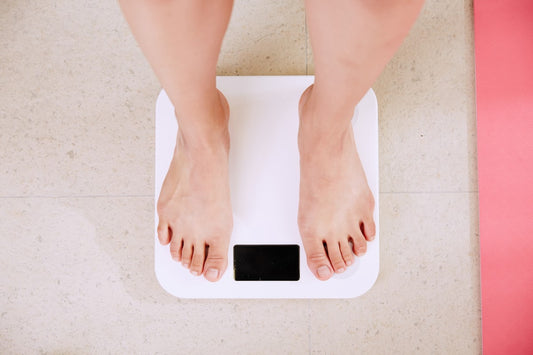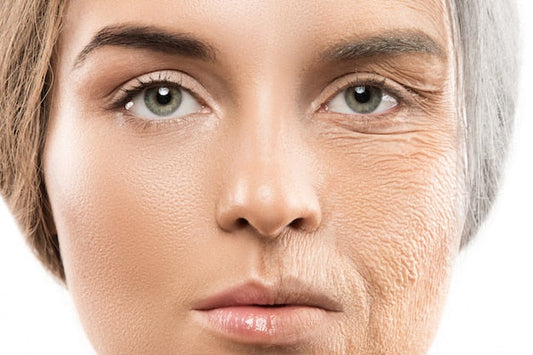Ever feel like your skin’s lost its spring? There’s a reason for that — and it starts with elastin. This vital protein is like your skin’s natural elastic band, keeping it firm, tight, and able to bounce back. But, as we age, our skin goes through noticeable changes — fine lines start to appear, wrinkles deepen, and that youthful firmness seems to fade. It's a natural process, but understanding why it happens can help us make better choices for our skin.

Elastin — a powerful protein that keeps our skin flexible and firm. Think of elastin as the skin’s “spring,” allowing it to bounce back into place after being stretched. But here’s the catch — elastin production slows down significantly as we age. By the time you hit your 40s, your skin may have lost around 30% of its elastin, contributing to sagging and creases.
This is why some people turn to elastin supplements — hoping to restore that youthful bounce. But do these supplements really work? Can they help reduce fine lines or improve skin firmness? Let's dive into the details and see what science has to say.
What Is Elastin?
Let’s first know what elastin actually is. Imagine your skin as a rubber band — when you stretch it, it snaps back into shape. That’s exactly what elastin does for your skin. It’s a key protein found in your body’s connective tissues, especially in your skin, lungs, and blood vessels. Thanks to elastin, your skin stays firm, smooth, and bouncy.
But you all know it doesn’t stick around forever. As you age, your body gradually produces less of it. This decline means your skin starts to lose its ability to snap back into place as easily. Over time, this can lead to noticeable signs of aging, like sagging skin, fine lines, and wrinkles.
How Do Elastin Supplements Work?
Ever wondered if elastin supplements can really bring back that youthful bounce to your skin? The idea behind these supplements is quite interesting — they aim to support your body’s natural elastin production or improve the overall structure of your skin.
Elastin supplements often contain ingredients that provide the building blocks your body needs to maintain or rebuild elastin. For example, peptides are commonly included because they act like messengers, encouraging your skin to produce more elastin and collagen. Collagen itself is another key ingredient, and while it doesn’t replace elastin directly, it works alongside it to maintain your skin’s strength and flexibility. Together, they help create a firm yet supple texture.
Antioxidants are also a popular addition to elastin supplements. Ingredients like vitamin C, green tea extract, or resveratrol protect your skin from free radicals, which can break down elastin over time. By defending your skin from this damage, antioxidants help preserve its firmness and slow down the signs of aging.
In short, elastin supplements aim to support your skin’s natural structure, helping it stay smoother, firmer, and more resilient. While they can’t completely stop aging, they may offer a helpful boost in maintaining youthful-looking skin.
Benefits of Elastin Supplements for Aging Skin
When it comes to maintaining youthful skin, improving elasticity is key — and that’s where elastin supplements may offer some support.
1. Improved Skin Elasticity
One of the most talked-about benefits of elastin supplements is their potential to improve skin elasticity — the very quality that keeps your skin firm, plump, and youthful.

When your skin has good elasticity, it can stretch and bounce back to its original shape easily. This flexibility is what allows your skin to move with your facial expressions without forming lasting creases. But as elastin levels naturally decrease with age, your skin may start to lose this ability. That's when fine lines, wrinkles, and sagging start to appear.
Some studies have explored the potential benefits of elastin supplements for improving skin elasticity. For instance, a study found that twice-daily application of an elastin-like recombinant polypeptide (ELR)-containing essence for 28 days significantly improved skin elasticity and reduced wrinkles.
Many people who try elastin supplements notice that their skin feels less ‘loose’ and more resilient over time. While these supplements can’t turn back the clock completely, they may provide valuable support alongside a healthy skincare routine, helping your skin maintain that youthful bounce.
2. Reduced Wrinkles
When it comes to wrinkles, the key lies in your skin’s ability to stay firm and flexible. Wrinkles often form because the skin loses its ability to ‘snap back’ after being stretched — whether from smiling, frowning, or even sleeping in certain positions. This is where elastin plays a huge role.

Elastin is like the invisible spring within your skin that keeps it tight and resilient. When you're young, this spring is strong and bouncy, allowing your skin to smooth out easily after movement. But as elastin levels decline with age, that spring weakens, making your skin slower to return to its original shape. Over time, those expression lines — like crow’s feet, laugh lines, or forehead creases — start to settle in and become more permanent.
Elastin supplements are believed to help by improving the skin’s flexibility, which may reduce the depth and visibility of these lines. When your skin can stretch and bounce back more efficiently, wrinkles are less likely to deepen. While elastin supplements won’t erase wrinkles overnight, studies suggest they may help soften their appearance by supporting the skin’s natural structure.
For instance, a study published in the International Journal of Molecular Sciences reported that participants who took hydrolyzed elastin supplements experienced improved skin elasticity, which was linked to a reduction in wrinkle depth. This suggests that by enhancing the skin's stretch and recovery ability, elastin supplements may help skin look smoother and more youthful.
It’s important to note that elastin supplements are most effective when combined with other healthy habits. Staying hydrated, protecting your skin from UV damage, and following a nourishing skincare routine can enhance the results and keep your skin looking its best.
3. Enhanced Hydration
Elastin supplements are gaining attention not just for improving skin firmness but also for enhancing hydration. While elastin itself isn’t a direct moisture-retaining molecule like hyaluronic acid, it plays a crucial role in maintaining your skin’s structure — which indirectly influences how well your skin holds onto moisture.
Elastin supplements may play a helpful role in improving skin hydration by strengthening the skin’s structure. While elastin itself doesn’t directly attract moisture like hyaluronic acid, it contributes to the skin's ability to hold water. Elastin fibres form a flexible network in the deeper layers of your skin, acting like tiny springs that allow your skin to stretch and snap back. When this structure is strong, the skin’s barrier remains intact, reducing water loss.
As elastin levels decline with age, this framework weakens, making the skin more prone to dryness and dehydration. By taking elastin supplements, you may help restore some of this structural support, allowing the skin to retain moisture more effectively. Additionally, many elastin supplements are combined with ingredients like collagen peptides or ceramides, which further improve hydration by boosting the skin's natural moisture-binding capacity. Together, these effects can leave the skin feeling plumper, softer, and better hydrated.
Natural Ways to Boost Elastin
While elastin supplements may offer some benefits, supporting your body’s natural elastin production can also make a big difference. Here are some effective ways to naturally boost elastin and keep your skin firm and youthful:
1. Eat Antioxidant-Rich Foods
Eating antioxidant-rich foods is crucial for maintaining healthy elastin fibres, which are essential for your skin’s firmness and elasticity. Elastin fibres are particularly vulnerable to free radicals — unstable molecules that cause oxidative stress and accelerate skin aging. This damage can break down elastin, leading to sagging, wrinkles, and reduced skin flexibility. Fortunately, antioxidants can help neutralise these harmful molecules, protecting your skin’s structure and supporting elastin health.
Certain vitamins and nutrients play a key role in this process. Vitamin C is essential for collagen production, and since collagen and elastin work together to keep skin firm, boosting your vitamin C intake can indirectly support elastin. Foods like citrus fruits, bell peppers, and leafy greens are excellent sources. Additionally, vitamin C helps reduce oxidative stress, which can weaken elastin over time.
Vitamin A is another vital antioxidant that aids in skin repair. It helps regenerate damaged elastin fibres and maintains your skin’s overall structure. Carrots, sweet potatoes, and spinach are packed with vitamin A, making them excellent additions to your diet.
Polyphenols, powerful plant-based antioxidants, also offer remarkable skin benefits. Found in foods like berries, green tea, and dark chocolate, polyphenols help reduce inflammation and protect elastin from environmental stressors like pollution and UV rays.
Including a variety of antioxidant-rich foods in your daily meals can provide your skin with the nutrients it needs to stay firm, elastic, and youthful. Combining these dietary habits with a good skincare routine and sun protection can further enhance your skin’s ability to maintain its structure over time.
2. Protect Your Skin from UV Damage
UV rays are a major threat to your skin’s elastin, accelerating its breakdown and contributing to premature aging. When your skin is exposed to sunlight, it triggers enzymes called matrix metalloproteinases (MMPs). These enzymes are meant to help with skin repair, but excessive MMP activity — often caused by prolonged sun exposure — ends up degrading healthy elastin fibres instead. This process weakens your skin’s structure, leading to sagging, wrinkles, and loss of firmness.
To protect your skin and preserve elastin, consider these essential steps:
· Apply Sunscreen Daily: Using a broad-spectrum sunscreen with SPF 30 or higher is one of the most effective ways to shield your skin from harmful UVA and UVB rays. Even on cloudy days or during winter months, UV rays can penetrate the skin and cause damage. Be sure to apply sunscreen generously to your face, neck, and any exposed areas, reapplying every two hours if you’re outdoors.

· Wear Protective Clothing: Clothing acts as a physical barrier against UV exposure. Opt for wide-brimmed hats, UV-protective sunglasses, and long sleeves when spending extended time outside. These protective measures reduce direct sunlight exposure, helping to safeguard your skin’s elastin fibres.
· Use Antioxidant-Rich Skincare: While sunscreen offers vital protection, antioxidant-based skincare can provide an added layer of defence. Products containing vitamin C, vitamin E, or green tea extract help neutralise free radicals generated by UV exposure. These antioxidants minimise oxidative stress, which further helps prevent elastin breakdown.
By combining these strategies — daily sunscreen use, protective clothing, and antioxidant skincare — you create a strong defence against UV damage. This proactive approach can help your skin maintain its firmness and elasticity for longer, reducing the visible signs of aging.
3. Follow a Proper Skincare Routine
A well-thought-out skincare routine plays a key role in protecting and strengthening your skin’s elastin. By choosing products that nourish, repair, and defend your skin, you can slow the natural decline of elastin and maintain a firmer, more youthful appearance. Here’s how each step can help:
Gentle Cleansing
Cleansing is the foundation of any skincare routine, but harsh cleansers can strip your skin’s natural oils, weakening its protective barrier. When this barrier is compromised, your skin becomes more vulnerable to environmental stressors that degrade elastin. Opt for a mild, hydrating cleanser that removes dirt and excess oil without disrupting your skin’s natural moisture balance. Ingredients like glycerin, ceramides, or aloe vera are ideal for soothing and protecting the skin.
Retinoids/Retinol
Retinoids — powerful vitamin A derivatives — are well-known for promoting cell turnover and improving skin texture. But they may also play a role in maintaining elastin. Retinoids stimulate fibroblasts, the cells responsible for producing collagen and elastin. By encouraging skin renewal, retinoids can help reduce the appearance of fine lines, improve elasticity, and keep your skin feeling firmer. Start with a gentle retinol product if you’re new to vitamin A treatments, applying it 2-3 times a week to avoid irritation.
Peptides
Peptides are short chains of amino acids that act as building blocks for proteins like collagen and elastin. Some peptide-based skincare products are designed to stimulate fibroblasts, encouraging these cells to produce more elastin and collagen. This can improve your skin’s firmness and resilience over time. Look for products containing copper peptides, matrixyl, or palmitoyl peptides, which are commonly used in anti-aging formulas.
Moisturisers with Ceramides
Ceramides are lipids (fats) that naturally occur in the skin and play a key role in maintaining a healthy barrier. Moisturisers enriched with ceramides help reduce transepidermal water loss (when moisture escapes from your skin). By improving hydration and strengthening your skin barrier, ceramide-based moisturisers indirectly support elastin’s role in maintaining firmness. This is especially important as dry, dehydrated skin can worsen the appearance of sagging and fine lines.
Bonus Tip:
For even better results, combine these steps with antioxidant serums, like those containing vitamin C or niacinamide, to further protect elastin fibres from oxidative damage.
4. Exercise for Better Circulation
Regular exercise does more than keep you fit — it can also support your skin’s elasticity by improving blood circulation. When you engage in physical activities like walking, yoga, or swimming, your heart pumps oxygen and nutrient-rich blood more efficiently throughout your body, including your skin. This improved blood flow nourishes fibroblasts, the cells responsible for producing elastin and collagen. By delivering essential nutrients to these cells, exercise helps maintain the skin’s structure and firmness.
Research also suggests that exercise may reduce signs of aging at a cellular level. A study published in Aging Cell found that regular aerobic exercise improved mitochondrial function in skin cells, which is crucial for energy production and repair processes. Improved cell function supports the maintenance of elastin and other proteins that keep skin youthful.
Best Exercises for Skin Elasticity
While any physical activity can boost circulation, certain types of exercise may offer additional skin benefits:
· Yoga: Poses that increase blood flow to the face, such as inversions (e.g., downward dog), can help oxygenate skin cells and promote repair.

· Walking or Jogging: These activities improve overall circulation, ensuring your skin receives a steady supply of nutrients.
· Swimming: This low-impact exercise enhances blood flow without stressing your joints, making it ideal for long-term skin health.
Post-Workout Skincare Tip:
After exercising, be sure to cleanse your skin to remove sweat and prevent clogged pores. Following up with a hydrating moisturiser can help maintain your skin’s moisture balance and support elastin’s role in keeping skin firm.
By combining regular exercise with a proper skincare routine and a nutrient-rich diet, you can create an environment that supports elastin production and promotes healthier, more youthful-looking skin.
FAQs
1. Do elastin supplements really work?
Elastin supplements can support your skin's natural ability to stay firm and elastic. While they won’t completely reverse signs of aging, they may help reduce sagging and improve skin flexibility. These supplements often contain ingredients that stimulate elastin production or protect existing elastin fibres. For best results, combining supplements with a healthy lifestyle, proper hydration, and a good skincare routine is key.
2. How long does it take to see results from elastin supplements?
The timeline varies from person to person. Most people start noticing subtle improvements in skin firmness, texture, and hydration within 4 to 8 weeks of consistent use. However, long-term results — like fewer visible fine lines and improved skin elasticity — may take 3 to 6 months. Patience is key, and results are often better when supplements are combined with other healthy habits.
3. Are there any side effects of taking elastin supplements?
Elastin supplements are generally safe when taken as directed. Some people may experience mild side effects like bloating, stomach discomfort, or allergic reactions, especially if they have sensitivities to certain ingredients. To minimise risks, start with the recommended dose and check for allergens on the product label. If you’re pregnant, breastfeeding, or have any medical conditions, consult your healthcare provider before starting elastin supplements.
4. Can I take elastin supplements with collagen supplements?
Absolutely! Elastin and collagen are both essential for maintaining youthful, firm skin — and they work best together. Collagen provides structure, while elastin gives your skin its flexibility and bounce. Taking both supplements may offer enhanced benefits, improving skin texture, reducing fine lines, and promoting overall skin health.
Conclusion
When it comes to maintaining youthful, firm skin, elastin plays a huge role — and that’s why supporting it is so important. While aging naturally reduces your elastin levels, taking steps like following a solid skincare routine, eating antioxidant-rich foods, and protecting your skin from UV damage can go a long way.
As for elastin supplements, they’re not a magic fix, but they can provide valuable support. By strengthening your skin’s structure, improving elasticity, and boosting hydration, these supplements may help your skin feel firmer and look smoother. Combined with healthy lifestyle choices, they can be a helpful addition to your anti-aging routine.




